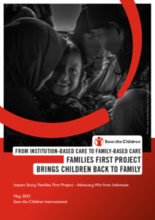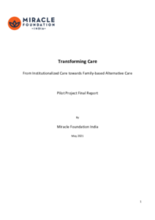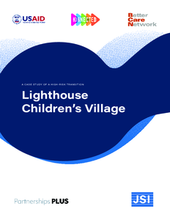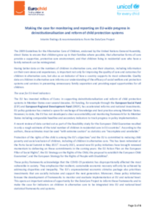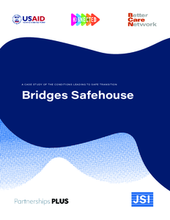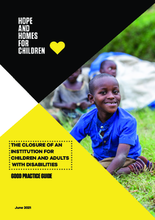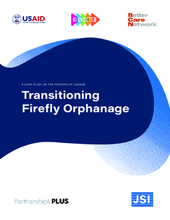Displaying 91 - 100 of 668
Families First Project is a program initiated by Save the Children in Indonesia in collaboration with the Indonesian Government to promote a safe family environment for raising and caring for children, either in their own families or in family and community-based care alternatives.
This is the summary report for a pilot project spearheaded by Miracle Foundation India with its two partner organizations which were two Children's Care Institutions (CCIs) in the Indore District in central India. The goal of the pilot was to ‘create a replicable modal for other CCIs to effectively implement family based and alternative care through systemic change by engaging multiple stakeholders’.
UNICEF Bulgaria's project, "Family for Every Child," aimed to demonstrate that viable alternatives to institutionalization exist, and that as long as a network of suitable support services is in place, deinstitutionalization is achievable. UNICEF Bulgaria commissioned this evaluation to establish whether the project had been successful
With current knowledge of alternative child care and in light of the holistic ministry, this article suggests an approach for the Christian church to care for orphans and children at risk by focusing on the family and the local community.
Lighthouse Children’s Village was established in 2004 as a privately-run and privately-funded residential care institution. In 2014, its long-time principal donor made the decision to phase out of financially supporting institutional care. This case study highlights some of the early warning signs and subsequent discovery of unethical and criminal behavior that can sometimes be observed in a transition process.
Families over Facilities is a call to action to end the unnecessary institutionalization of children in child welfare. The report details the physical, mental and emotional harm done to children in group settings, the significant unnecessary taxpayer costs associated with the practice, and violations of children’s civil and human rights.
The DataCare Project seeks to map how EU Member States and the UK currently collect data on the situation of children in alternative care. This report presents the interim findings of this project, based on the analysis of 14 countries who participated in the study at the end of 2020.
This case study highlights some of the prerequisites for the starting point of a successful transition from residential care to a non-residential model, many of which are often overlooked or underestimated. The case study is organized around the various stages of transition and explores some of the key themes outlined in the Transitioning Models of Care Assessment Tool.
This document outlines 5 key steps that serve as an effective blueprint for a successful reintegration process of children and disabilities. These include ‘engagement’, ‘Assessment’, ‘Design & Development’, ‘Transition’, and ‘Monitoring & Evaluation’.
This case study highlights some of the key dynamics that arose throughout one organization's process of transitioning their services from residential care to non-institutional programming and examines how those dynamics both influenced the transition and determined the type of support provided, as well as the most appropriate transition strategy. The case study is organized around the various stages of transition and explores some of the key themes outlined in the Transitioning Models of Care Assessment Tool.

